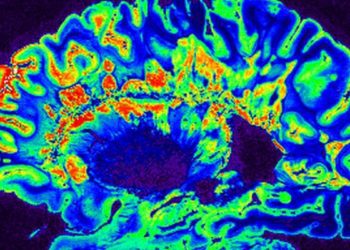Hypertension drug guanabenz may improve multiple sclerosis outcomes [Pre Clinical]
1. Both in vitro and in a mouse model, guanabenz treatment improved the survival of myelin-producing oligodendrocyte cells in the presence of pro-inflammatory INF-g, a cytokine associated with multiple sclerosis (MS) pathogenesis.
2. In mouse models of MS, guanabenz treatment decreased the severity of clinical symptoms and relapse.
Evidence Rating Level: 2 (Good)
Study Rundown: In multiple sclerosis (MS), chronic inflammation of the central nervous system leads to the loss of oligodendrocytes, the cells that produce insulating myelin material necessary for proper neuron function. While MS treatments have largely focused on reducing inflammation, researchers are looking into alternative approaches aimed at promoting oligodendrocyte survival. Guanabenz has previously been shown to improve oligodendrocyte response to stress. With this in mind, the goal of the current study was to test the drug’s ability to improve MS outcomes through increased oligodendrocyte survival. The researchers demonstrated that in cell culture under inflammatory conditions, guanabenz treatment increased the number of surviving oligodendrocytes and myelinated neurons. These improvements were specifically due to prolonged oligodendrocyte integrated stress response. In mouse models of MS, guanabenz treatment resulted in improvement of a number of clinical outcomes, including decreased peak symptom severity, delayed time of disease onset, and decreased relapse severity.
As guanabenz is an FDA-approved drug, further studies of its efficacy in treating MS may be expedited. Another strength of this study is that clinically relevant, FDA-approved doses of guanabenz were used. Although guanabenz does not address the root cause of MS, alleviating downstream pathology may be a viable therapeutic strategy. Overall, the study highlights the potential of targeting oligodendrocytes in MS treatment.
Click to read the study in Nature Communications
Relevant Reading: Endoplasmic reticulum stress in disorders of myelinating cells
In-Depth [animal study]: Researchers used a number models and methods to explore guanabenz protective capabilities, both in vitro and in mice. The inflammatory cytokine interferon gamma (IFN-γ) has been implicated in MS pathogenesis, and shown to cause oligodendrocyte death. First, to determine if guanabenz protected oligodendrocytes against IFN-γ-induced death, researchers exposed the cells to IFN-γ, and then treated with guanabenz. Second, to then investigate if guanabenz would protect against the clinical symptoms of MS progression, researchers dosed previously-developed animal models of MS with the drug.
When differentiating oligodendrocyte precursor cells were treated with IFN-γ, cell survival decreased by 22.5% compared to untreated cells. Treatment with IFN-γ along with 5µM guanabenz improved cell viability (p < 0.05). Treatment with guanabenz alone did not significantly impact cell viability, indicating that it was not toxic in this experimental system. In a separate in vitro experiment, rat cerebellar explants were treated with IFN-γ and guanabenz. Compared to explants treated with IFN-γ alone, explants treated with IFN-γ and 10µM guanabenz showed a significantly higher number of myelinated axons (p < 0.05). In a mouse model of inducible IFN-γ expression in the central nervous system, daily treatment of 4mg/kg guanabenz over 12 days resulted in a significantly higher number of oligodendrocytes in the medial corpus callosum compared to vehicle-treated controls (p < 0.005).
A mouse model of MS, experimental autoimmune encephalomyelitis (EAE) was used to evaluate guanabenz ability to prevent clinical progression of MS. In this model, daily guanabenz treatment was initiated 7 days after EAE induction and continued until the end of the study (over 40 days after induction). Compared to EAE controls, daily treatment with 8mg/kg guanabenz resulted in a later onset time of disease (p < 0.0005) and lower clinical score at peak of disease (p < 0.05). Additionally, the treated animals had fewer spinal cord lesions (p < 0.0005) and more oligodendrocytes (p < 0.005). In a second mouse model that recapitulated relapsing-remitting EAE, daily treatment with 8mg/kg guanabenz beginning at disease onset led to significantly decreased clinical severity compared to vehicle control (p = 0.038).
Image: PD
©2015 2 Minute Medicine, Inc. All rights reserved. No works may be reproduced without expressed written consent from 2 Minute Medicine, Inc. Inquire about licensing here. No article should be construed as medical advice and is not intended as such by the authors or by 2 Minute Medicine, Inc.







